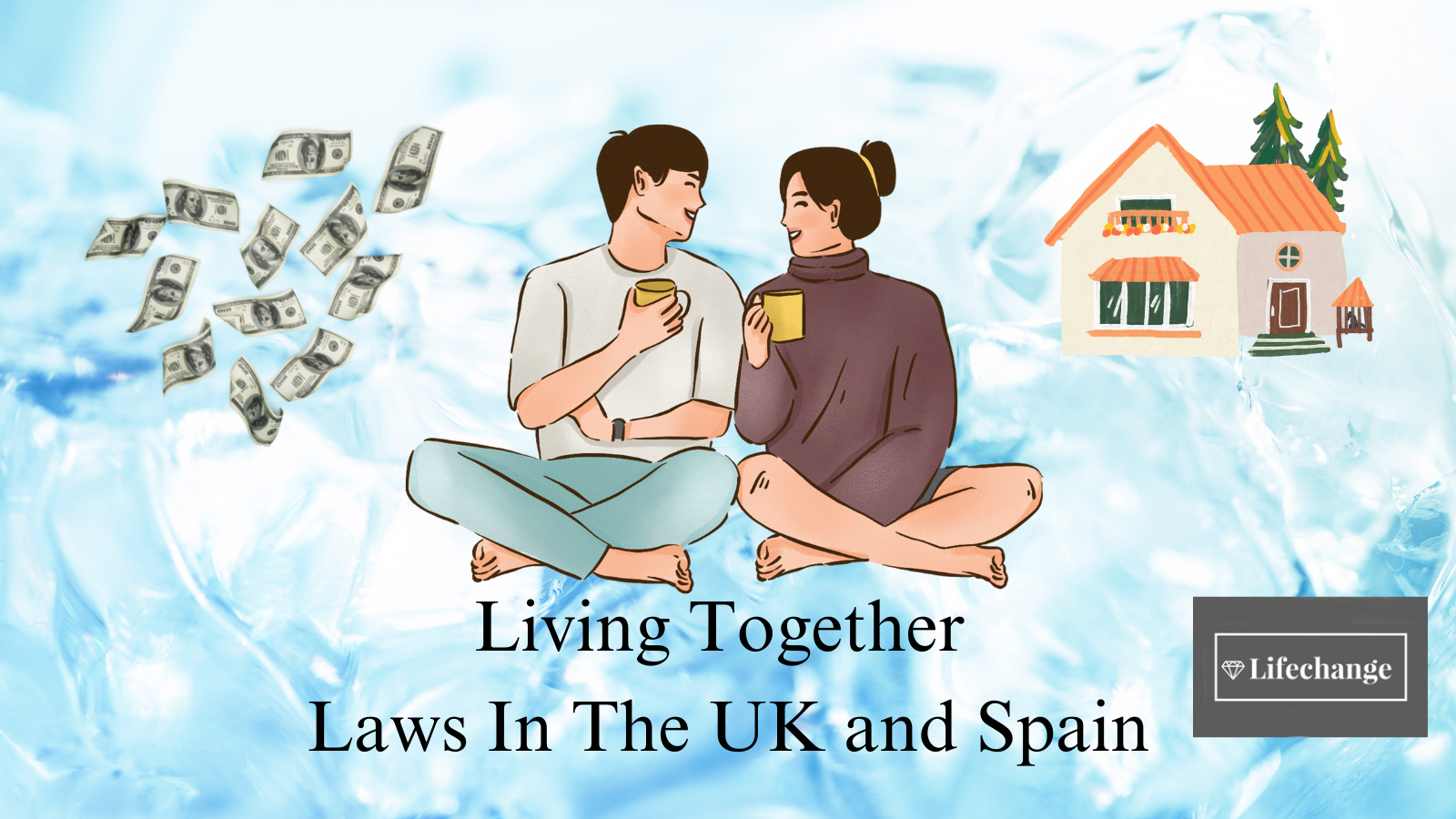A chapter from my first self-published book
Cohabiting Statistics, UK
The obvious trend is for more and more couples to live together without getting married. Cohabiting couple families were the second-largest family type at 3.5 million, followed by lone-parent families at 2.9 million. (trend-monitor.co.uk Feb 2020)
Living Together Laws
Laws that offer no protection for couples and particularly disadvantage women in cohabiting relationships. Married couples who divorce can have their property legally divided, unmarried couples do not have the same rights, without proof of ownership.
So for example when one partner (usually the man) is named on the deeds to the house and the other party (the woman) is not, but she has contributed in some way over the years. If they split up she has no legal protection.
There is no automatic right to inheritance unless a will has been created. There are also no rights to pensions between cohabiting couples.
What Protection is Available?
- Couples can have a cohabitation agreement drawn up.
- When purchasing a property together ensure both names are on the deeds of the family home or draw up a declaration of trust if ownership is to be in unequal shares.
- Taking out life insurance and creating a will is also a good idea.
When couples meet and decide to move in together the last thing that you are thinking about is what will happen if you separate. Or if one partner should die unexpectedly. But this conversation should take place, it is very important to be clear on what is intended when you are forming a new cohabiting relationship. If you do not put some simple protections in place at the start of the relationship it can leave one or both partners in “precarious” situations.
Precarious Situation
In my case, despite the ex-partner declaring the property to be our first home and him making his will to ensure I would have some protection if he died unexpectedly. I was not named on the deeds. When he terminated the relationship the way he did and left me floundering in Spain in the property he had purchased for our retirement together I was in a “precarious” position as soon as he threatened me with eviction.
He had been responsible for paying the bills at the property most of which were on direct debits from his bank account. Even though he offered what he termed “gifts” in his financial settlement letter nothing he offered was given and nothing was legally signed. Phillip had the power and control of that. However, because of his inability to have an adult conversation, he ended up being responsible for the utilities, house tax and insurance at the property after he had left in September 2020.
Financial Control and Predicament
In Spain, an owner can not terminate the utilities at a property when it is occupied, even if that occupation is by squatters.
Due to his refusal to “negotiate” or help me by paying an advance payment to redeem my UK mortgage, I was left in a financial predicament. This may not have been too much to bear but the stark realisation of his abusive behaviour, the sudden termination of our relationship and then understanding that I had been involved with a man that showed no empathy, no compassion and then blamed me for the situation he left me in.
That caused me more emotional trauma than anything else, I was coming to terms with the facts of having been in an emotionally and psychologically abusive relationship. That hurt me deeply, as memories of the twisted things he did and said would pop into my mind, his cruel hurtful verbal outbursts. The sadistic sexual acts that I was manipulated and conditioned to accept. It was all too much. I was close to a complete emotional breakdown on several occasions in the weeks and months that followed his departure from the villa.
So what are the issues that couples need to consider?
Talking about and planning for your future doesn’t mean that you are expecting to split up, it’s just a sensible way of entering such a huge commitment and making sure you are protected should the worst happen.
The property in which you live is always going to be the biggest concern, and unless you are clear from the outset about how you co-own, co-tenant or co-occupy your property, then things can get pretty messy if the relationship hits the rocks. If your name isn’t on the deed and there’s no evidence of any agreement between the two of you then it’s going to be very difficult to claim an interest in your home.
It would be very unwise for someone to make a significant investment or contribution into the property that’s owned by their partner unless there is a very clear understanding between them as to what interests they may have in that home.
If you are to have children together, consider what arrangement you want to put in place for their security as they grow up.
Avoid casual conversations.
Don’t assume just because you’ve talked things through that everything is going to be fine. All too often people who have sadly lived their relationship on trust and when one partner betrays the other and terminates the relationship, that trust you once had has turned out to be meaningless when it comes to any legal rights. On the other side of the coin, be careful about making promises, as that could be used as evidence of an agreement if you break up. Of course, relationships are built on trust and it can be very difficult to bring the subject up. However, it is worth remembering that when things are rosy everything seems fine but the situation and the picture can change very quickly when the relationship turns sour.
If things are not set out in an agreement, you will be relying on who said what and when then if you end up in a dispute a judge will decide whose word is to be believed. That can end up very costly and very uncertain in terms of outcome and therefore it makes a lot of sense to have honest discussions from the start so you both know where you stand on this.
Settlements out of court are better.
Couples often don’t make these provisions. They don’t realise the importance of having a legal contract. As the law stands they are disadvantaged there is no protection if one partner dies there are no automatic inheritance rights. If the relationship ends then a division of property and pensions is not covered by current laws. Settlements out of court are better.
What I very quickly discovered is just how many gaps there are in the laws, firstly in living together with no legal certificate and secondly in the process of making a complaint against my now ex-partner for gender violence while living in Spain.
Fundamentally it is women who are disproportionately disadvantaged in this scenario. Lawyers don’t come cheaply, you can obtain initial free advice, but that advice offers no real answers and then to actually instruct an international lawyer that will work between Spain and the UK I was quoted a £1,000 deposit and then advised that if they were to take on my case the fees could be anywhere from £5,000 upwards. Money I just did not have and was not willing to commit to spending.
Because the law does not have specific remedies in cases like these, a dispute between two people who were previously in a relationship, for example where the man is in control of the finances and the woman becomes wholly dependent there is no law that takes into account any contribution that women make in the home making, caring and in any other non-earning capacity.
The law is not fit for purpose
So the reality is that as it stands the law is not fit for purpose, the gaps in the law have been likened to ravines. Of course, couples who decide to live together could opt to form a civil partnership, an option that is available to opposite and same-sex couples. By registering a civil partnership it will give your relationship some legal recognition and added legal rights.
Living together in Spain. Registering “Pareja de Hecho”
What does Pareja de hecho mean? Roughly translated it is an “official couple” and is equivalent to a “civil union.” It gives couples many of the advantages of being married, without many of the obligations.
Each autonomous community has its requirements for registering pareja de hecho, plus there are some legal qualifications.
For example, At least one person in the relationship must be registered in the autonomous community where the union will be registered. Each person must also be legally single and not married or “Pareja de hecho” to any other person. So each person has to prove they are divorced, legally separated or widowed.
You must not be related to each other and you need to be over the age of 18. You need to show you have lived together for 12 uninterrupted months. Plus you must be mentally capable of entering into the official relationship status. You should be aware that in Spain the law does not currently automatically recognise a claim on property and assets between unmarried couples. So if you are going to reside in Spain as a couple living together you should make the necessary plans to either register a formal relationship or actually get married.
The title of my book “Post Separation Abuse. Betrayal and Abandonment. What Type Of Man?” caused a former partner to take criminal action against me in the Spanish courts for defamation.
Reasons why I have written this book.
To raise awareness of the hidden emotional and psychological abuse that can happen in relationships.
Highlighting the gaps in the laws and how the system can fail those who need protection. How the laws concerning separation of couples who are cohabiting are not fit for purpose and how cohabiting couples do not have the same legal rights as married couples or those in a civil partnership. To show how after the end of a relationship, abuse can continue in what can be termed post-separation abuse when one party in the relationship chooses conflict over discussion and negotiation. How the legal system can be used by the offender to further cause emotional and financial devastation to the victim?
Emotional and psychological abuse comes under the term “Coercive Control” in the UK, a law that was passed in March 2015 and came into force on the 29th of December 2015.
Victims of abuse often know that what has been happening to them isn’t right, but they don’t understand that it was domestic abuse and that it is now illegal.
For all the women who didn’t survive, those who were not able to get through the trauma and gave up on themselves and their future. More needs to be done to raise awareness and protect those who suffer this “hidden emotional and psychological abuse”. Domestic violence is a factor in up to one-quarter of female suicide attempts.
Facts on post-separation abuse. In the year ending March 2020, an estimated 2.3 million adults aged 16 to 74 years experienced domestic abuse. (1.6 million women and 757,000 men). Figures published in 2022.
As an update to my published book for this article
Unfortunately, attributing suicide directly to domestic violence can be difficult due to the complexity of contributing factors. However, we can look at resources to understand the bigger picture.
United Kingdom
A total of 242 domestic abuse-related deaths were recorded between April 2022 to March 2023, including 93 suspected victim suicides following domestic abuse (SVSDA) 80 intimate partner homicides (IPH) and 31 adult family homicides (AFH)
(Mar 13, 2024, Quoted From NPCC National Police Chiefs’ Council)
I believe it is important to note that the report quoted above indicates the following risk factors, “controlling and coercive behaviour, mental ill health, alcohol use, drug use and separation/ending of the relationship.”
Spain
There do not seem to be any equivalent statistics in Spain for suspected victim suicides following domestic abuse or gender violence.
Recommended Reading
My recommended reading for professionals in the field of supporting victims of domestic violence is:-
“In Control: Dangerous Relationships and How They End in Murder”
Professor Jane Monckton Smith, a former police officer and internationally renowned professor of public protection, has developed her ground-breaking research into an eight-stage homicide timeline. Setting out identifiable stages in which coercive relationships can escalate to violence and murder.
Here are the eight stages
- A pre-relationship history of abuse or stalking.
- A whirlwind romance and then marriage or serious relationship
- Elements of domination and coercive control
- A threat to the perpetrator’s control. Relationship ends, or financial issues.
- There is an escalation in control tactics, Stalking, or threatening behaviours.
- The perpetrator has a change in thinking, seeks revenge, or homicide
- Planning stage. Seeking opportunities to get the victim alone, might buy weapons.
- Homicide. The perpetrator kills the victim and possibly harms others, such as the victim’s children.
Helplines
If you are concerned about domestic violence or suicide for yourself or someone you know, please reach out to a crisis hotline or support organisation.
- Spain: 016 (anonymous national helpline for victims of gender violence)
- UK: 999 (emergency services) or The Samaritans 116 123 (24/7 confidential support)
“As an Amazon Associate, I earn from qualifying purchases.”


